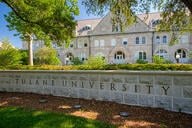You have /5 articles left.
Sign up for a free account or log in.
WASHINGTON -- Call it couples therapy for higher education administrators.
Gathered here Monday, about 30 provosts and chief financial officers began a two-day seminar devoted to the important, fragile and sometimes strained relationship that often exists between their two positions. Co-sponsored by the American Council on Education (ACE) and the National Association of College and University Business Officers (NACUBO), the conference proved an opportunity for two of the key decision makers at most institutions to discuss the pressures and pleasures of jobs that are increasingly defined by diminishing resources in a troubling economic climate.
A key theme emerging during the daylong sessions was the tension between a tradition-bound world of higher education and an emerging realization – particularly among CFOs – that the business model for colleges and universities needs changing.
Rick Staisloff, vice president for finance and administration at the College of Notre Dame of Maryland, said he learned early on that many in academe are sensitive to any rhetoric that appears to have emerged from the business world. When Staisloff would speak of education as a “product" even a few years ago, “people just freaked out completely,” he said. Staisloff said he’s seen that sort of knee-jerk response diminish considerably in the last year, however, and credited the economic crisis with an increased acknowledgment that the business of higher education cannot remain a taboo subject.
To garner support from groups and individuals who may be skeptical about decisions that appear overly driven by an institution's financial bottom line, it's incumbent upon financial officers and provosts to publicly support each other, a panel of college presidents told the group. Faculty and staff need to be assured that the academic side of the house is working in lockstep with the business side – even though some may “look for wedges to drive between them,” said Carol Cartwright, president of Bowling Green State University. That said, Cartwright was insistent that it’s both natural and beneficial for provosts and CFOs to bring different – even conflicting – viewpoints to an internal discussion.
“One of the most difficult challenges of a president is to get people to challenge each other,” she said.
Steven Poskanzer, who took over as president of Carleton College just a few days ago, agreed that CFOs and provosts should challenge each other – in private. After a decision has been made, however, their responsibility is to rally around a shared agenda, he said.
“These two individuals must present a united front to the rest of the world,” said Poskanzer, who was previously president of the State University of New York at New Paltz.
In some instances, presenting that united front means physically appearing alongside one another, said Sheri Noren-Everts, vice president and provost at Illinois State University. Indeed, it’s incumbent upon a provost to demonstrate that she works well with the CFO and understands the college’s financial position as well as its academic mission, she said.
“We make a point of being seen [together] in public,” Noren-Everts said of herself and her CFO.
A key aim of Monday’s sessions was to encourage candid discussion about what can be a challenging relationship, and for that reason NACUBO and ACE set conditions for Inside Higher Ed’s coverage of the event. While all but one of the sessions were open, the two organizations stipulated that participants’ comments be considered off the record unless explicit permission was given by the participant.




